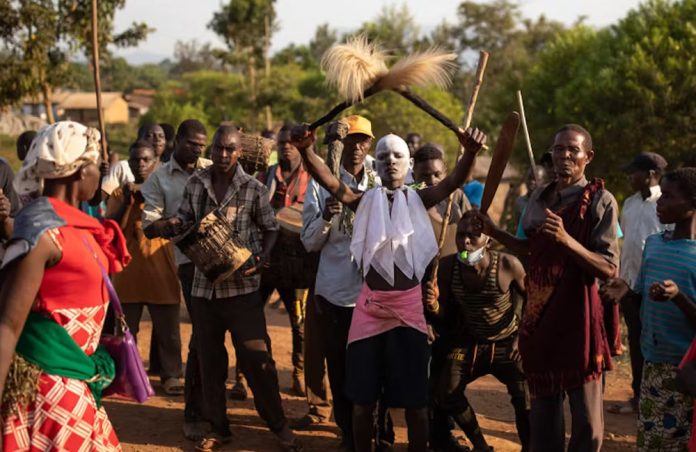Every August, many Bagisu or Bamasaba boys are figuratively initiated into manhood. Bagisu inhabit the western and southern halves of Mount Elgon in eastern Uganda. The boys, mostly aged between 12 and 16, undergo a traditional circumcision ritual called Imbalu. This process is done without any anesthetics. Imbalu literary means a big knife.
In Bugisu, the main ceremony in the region is always held at Mutoto, one Kilometer out of Mbale Town. Mutoto not only brings together Bamasaba from Uganda but also from Kenya. According to local folklore, Mutoto is the place where the first imbalu ceremony officially took place. All the subsequent imbalu opening ceremonies have taken place there ever since. In fact those who have witnessed the ceremonies equate Mutoto to Namugongo or Mecca where thousands of pilgrims throng annually.
It is not clear when exactly imbalu started. But folklore has it that the Bamasaba took it up “for the safety of the boys” especially so after a Mumasaba boy bruised his foreskin during intercourse with a girl.
“So to protect other boys, the Bamasaba adopted circumcision,” says Bob Mushikori, a minister in the Inzuyi Bamasaba (the House of Bamasaba). “It is now part of our culture. It is something that identifies us.”
Another tradition states that imbalu originated from the demand by the Kalenjin when Masaba, the Bagisu hero ancestor, wanted to marry a Kalenjin girl and so was forced to circumcise.
Yet another legend says the first person to be circumcised was being punished for seducing other people’s wives. Legend states it was decided to partially castrate him by way of circumcision. When he recovered he resumed his former practices and rumour went around that he had become excellent at sex. In order to compete favourably, other men decided to circumcise also.
Now, any Mumasaba boy aged 12 and above can undergo circumcision wherever he wants as long as it is before they make 18 years.
The community largely frowns upon males who even after they clock 18 deliberately avoid being circumcised.
Such males are derisively referred to as basinde, to imply that they are cowards. Even those who opt to be circumcised in health facilities – under anesthesia – are referred to as cowards. Thus many boys in the rural areas prefer to do it the traditional way.
Mushikori says in the beginning the Bamasaba used to circumcise the boys during odd years. However, in 1907, the region was hit by famine because of a prolonged dry season. As is the case today and then, feasting is part and parcel of the circumcision. Therefore a good harvest is an important aspect of Imbalu season.
However, due to the poor crop yield then, the community did not have enough food to feed the tens, or in some cases the hundreds, of people who are part of the entourage that accompanies the boys for circumcision therefore Imbalu did not take place that year.
In1908, against a backdrop of good crops yield, the community had enough food for all. So they (Bamasaba) resumed circumcising. From then on, the large traditional circumcision ceremonies are done mostly during even years.
The circumcision ceremony is preceded by the ‘candidates’ moving around the villages as they dance to kadodi, a rhythmic dream-beat unique to Bugisu meant for the ceremony. They boys wear only shorts with a bare chest. The boys are subjected to hard conditions as one of the ways they can prove that they are men.
To mitigate the cold in the largely hilly and chilly Bugisu while bare chest in the wee hours of the morning as they jog around, dancing. And to mitigate the heat – should their processions be in the afternoon when the sun is intense – they mostly run around bare. The boys usually have flywhisks that they wave as they dance whereas the other people in the processions wave twigs.
In some cases the dancing begins at dawn and goes on until dusk though it is interspersed with breaks during which the boys visit some of their relatives. The relatives prepare meals for the soon to be men to re-energise them before they continue with their processions.
Once they are done with eating, some relatives’ offer the boys live chicken or in some cases goats ‘for their bravery’.
The dances last between one and four weeks, depending on each family’s preference. In some cases, one week to the circumcision date, some families fete the boys to a local drink made of fermented millet, malwa, mixed with hot water. The initiation into drinking implies now that the boys are due for the rite of passage; they can as well do what is considered a preserve of adults.
On circumcision day itself, elders smear the boys to be circumcised with ash. “It makes them look like warriors. It is to psychologically prepare them for the surgeon’s knife,” says Mushikori. Some unconfirmed accounts however, say it is meant to reduce chances of a hemorrhage.
However, all the boys who are due for circumcision are encouraged not to have sex especially weeks before and after circumcision. It is believed that if they have sex prior circumcision, their foreskins harden, which then makes the circumcision more painful. The boys, now ashen, leave their homes for a central circumcision venue.
Once they have undergone the cut, assistants sprinkle a powdered herb called Ingu on the freshly circumcised penises to quicken the healing. In many cases, the wounds reportedly dry in three weeks. After the circumcision, the ‘graduates into manhood’ are feed on Obushera – millet porridge. They are also feed on pumpkins and the chicken they got because they are protein foods.
There have been health concerns raised about using one knife on all boys like it used to be in the past. Inzu yi Bamasaba insists that the traditional circumcision surgeons use a knife strictly on one person. Even then, the knives must be sterilized with hot water before the surgeons can shave off the boys’ foreskins.
Mr Mushikori says Inzi yi Bamasaba also want the traditional surgeons to be licensed by the Local Government Health Departments. That way, they would operate according to a strict health code of conduct. Those who flout the rules would lose their licenses, which would deny them a source of income. Besides, adhering to health standards would clear the anxiety on the minds of many boys lined up for this rite of passage.










